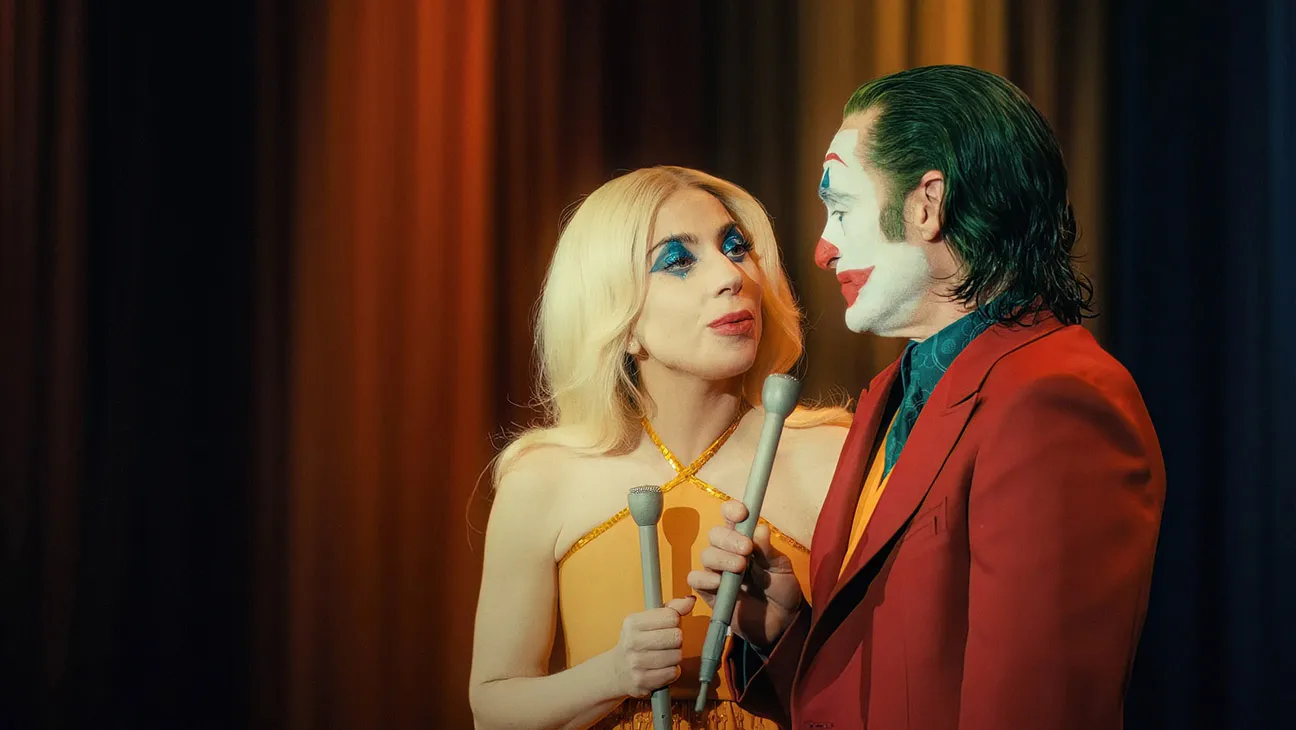
Joker was a controversial hit in 2019, using the iconic comic book villain as a conduit to explore real world, grounded themes in a gritty, Scorsese like world. Director Todd Phillips defied the odds and created a billion dollar grosser with star Joaquin Phoenix finally garnering his first Academy Award for playing the titular character. Despite the film going against the typical comic book movie grain, Warner Bros. convinced the pair to return and go the sequel route following its success. Now, the Joker is back in Joker: Folie à Deux.
Arthur Fleck (Phoenix) returns, this time institutionalized at Arkham State Hospital while awaiting a ruling on his mental competency to stand trial for the five murders he committed a few years back. Arthur continues to struggle mentally, with his lawyer arguing that he suffers from disassociation with “The Joker” being an entirely separate personality that commits these heinous acts. While walking past a music class, Arthur sees fellow patient Lee (Lady Gaga) and the two soon fall in love. Arthur is found competent enough for trial and now, their love is fated to its outcome.
Folie à Deux’s predecessor famously offered social commentary on both our society’s social welfare programs and its general attitude when it comes to interpersonal dynamics and how we treat not only our most vulnerable citizens, but everyone that we encounter. Joker’s critique of our culture of callousness and indifference to others told through the lens of a mentally ill, poor white man made the film a hot rod for America’s culture wars to much prerelease controversy. It is this previous political split that appears to be the subject of the meta commentary the new film offers as its theme as Phillips sets his sights on exploring those who latched onto “The Joker” in this fictional Gotham as a representation for their own frustration with the system and the elite and elevate Arthur into a symbolic figure while ignoring his real life struggles and trauma that have shattered his life and the lives of others.
In describing it, this tact seems ripe for a substantial sequel, but Folie à Deux’s presentation of this theme ends up being plodding and jumbled. The story presented that follows Arthur’s incarceration, trial, and increasing delusion powered by musical numbers lacks any compelling narrative or conflict that commands the audience’s attention and investment. Instead, the film plays like a series of scenes showing Arthur and Lee’s developing relationship and shared delusion in lieu of any examples of Arthur’s cult of personality as Joker and its effect on the world around him. His toxic relationship with Lee is supposed to be the stand-in for this, but her obsession with him is less a commentary on her need to bond and lose herself with the idea and fantasy of Joker and more of a shared psychosis between the two. It is not until the film’s third act where this motivation truly shine through for Lee and examples of the public’s fascination with Joker is revealed through courtroom attendees at his trial, but by then the film is nearly two hours into its runtime and it’s too late to make a substantial impact.
Perhaps the most contentious aspect of Folie à Deux heading into its release was the news that the film would be a musical. It seemed an odd touch in a follow-up to grounded, gritty drama and despite slight pushback, the film does heavily feature musical numbers throughout. As previously mentioned, these numbers are woven into the plot as the manifestation of Arthur’s mental delusions and dissociation in the face of having to confront his trauma and the subsequent feelings that arise from it. It’s a creative way to incorporate music into the film and provide an explanation for it, but they are often a distraction that add little to the films theme and the point it is ultimately trying to make. This isn’t helped by the fact that the original songs aren’t strong and Phoenix isn’t a singer or even an entertaining musical performer so the numbers themselves aren’t that interesting to hear or watch. Gaga does the best with she’s given, but not even her performances stand out as being particularly powerful.
Joker: Folie à Deux mostly feels like a lost opportunity to make something substantial out of a sequel that probably shouldn’t have happened in the first place. The original film felt like a fresh twist in a genre that had become cliche and formulaic, treating a comic book character with gravitas and using an iconic figure to offer commentary on the world and explore uncomfortable conversations that needed to be had. This follow up feels half baked with meta commentary that seems to confront the audience about how it reacted to its predecessor, critics and supporters alike, while attempting to be just as subversive, but not having the same assuredness in what it wants to say as was present previously. This feels owed not just to Phillips having less of a clear idea and passion for a follow-up, but in too much of the runtime being dedicated to the musical aspect instead of scenes fleshing out and exploring the movement of Joker supporters that had arisen out of the developments in the first film. Lightning doesn’t always strike twice and Joker: Folie à Deux serves as an example of the idiom.
Image: Warner Bros.

